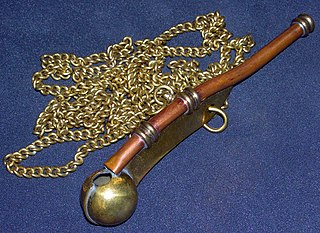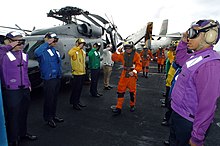
USS Constitution, also known as Old Ironsides, is a three-masted wooden-hulled heavy frigate of the United States Navy. She is the world's oldest commissioned naval warship still afloat. She was launched in 1797, one of six original frigates authorized for construction by the Naval Act of 1794 and the third constructed. The name "Constitution" was among ten names submitted to President George Washington by Secretary of War Timothy Pickering in March of 1795 for the frigates that were to be constructed. Joshua Humphreys designed the frigates to be the young Navy's capital ships, and so Constitution and her sister ships were larger and more heavily armed and built than standard frigates of the period. She was built at Edmund Hartt's shipyard in the North End of Boston, Massachusetts. Her first duties were to provide protection for American merchant shipping during the Quasi-War with France and to defeat the Barbary pirates in the First Barbary War.

A ship's bell is a bell on a ship that is used for the indication of time as well as other traditional functions. The bell itself is usually made of brass or bronze, and normally has the ship's name engraved or cast on it.

A boatswain, bo's'n, bos'n, or bosun, also known as a deck boss, or a qualified member of the deck department, is the most senior rate of the deck department and is responsible for the components of a ship's hull. The boatswain supervises the other members of the ship's deck department, and typically is not a watchstander, except on vessels with small crews. Additional duties vary depending upon ship, crew, and circumstances.
The coxswain is the person in charge of a boat, particularly its navigation and steering. The etymology of the word gives a literal meaning of "boat servant" since it comes from cock, referring to the cockboat, a type of ship's boat, and swain, an Old English term derived from the Old Norse sveinn meaning boy or servant. In 1724, a "cockswain" was defined as "An officer of a ship who takes care of the cockboat, barge or shallop, with all its furniture, and is in readiness with his crew to man the boat on all occasions." When the term "cockboat" became obsolete, the title of coxswain as the person in charge of a ship's boat remained.

1 Main Circuit (1MC) is the term for the shipboard public address circuits on United States Navy and United States Coast Guard vessels. This provides a means of transmitting general information and orders to all internal ship spaces and topside areas, and is loud enough that all embarked personnel are (normally) able to hear it. It is used to put out general information to the ship's crew on a regular basis each day. The system consists of an amplifier-oscillator group which is located in the IC/gyro room, a microphone control station, portable microphones at each control station and loudspeakers located throughout the ship. Control stations for the 1MC announcing system are located at the pilot house, OOD stations on the quarterdecks, aft steering and Damage Control Central area.
This glossary of nautical terms is an alphabetical listing of terms and expressions connected with ships, shipping, seamanship and navigation on water. Some remain current, while many date from the 17th to 19th centuries. The word nautical derives from the Latin nauticus, from Greek nautikos, from nautēs: "sailor", from naus: "ship".

United States Navy Armed Guard units were established during World War II and headquartered in New Orleans. The purpose of the guard was to man the deck guns of merchant ships to provide a nominal defense against attack. This was to counter the constant danger presented by enemy submarines, surface raiders, fighter aircraft and bombers. There was a shortage of escort vessels to provide the merchant vessels with adequate protection. The NAG had three training centers, at Norfolk, Virginia; San Diego, California; and Gulfport, Mississippi. At the end of the war, there were 144,857 men serving in the Navy Armed Guard on 6,200 ships.

Carl Maxie Brashear was a United States Navy sailor. He was a Master Diver, rising to the position in 1970, despite having his lower left leg amputated in 1966. The 2000 film Men of Honor was based on his life.

A boatswain's call, pipe, or bosun's whistle is a pipe or a non-diaphragm type whistle used on naval ships by a boatswain.
Ruffles and flourishes are preceding fanfare for honors music, ceremonial music for distinguished people.

Georgios Averof is a modified Pisa-class armored cruiser built in Italy for the Royal Hellenic Navy in the first decade of the 20th century. The ship served as the Greek flagship during most of the first half of the century. Although popularly known as a battleship (θωρηκτό) in Greek, she is in fact an armored cruiser, the only ship of this type still in existence.

John MacKenzie was a sailor in the United States Naval Reserve and a recipient of the Medal of Honor.
An officer of the deck (OOD) underway is a watchstanding duty officer on a surface ship in the United States Navy, United States Coast Guard, and NOAA Commissioned Officer Corps who is tasked with certain duties and responsibilities for the ship. The officer of the deck is either subordinate to the command duty officer or, in the absence of one, reports directly to the ship's commanding officer and executive officer, in the latter case holding responsibility for the ship altogether. This article describes duties and responsibilities for an underway OOD for surface ships only.
Seafaring is a tradition that encompasses a variety of professions and ranks. Each of these roles carries unique responsibilities that are integral to the successful operation of a seafaring vessel. A ship's crew can generally be divided into four main categories: the deck department, the engineering department, the steward's department, and other. The reasoning behind this is that a ship's bridge, filled with sophisticated navigational equipment, requires skills differing from those used on deck operations – such as berthing, cargo and/or military devices – which in turn requires skills different from those used in a ship's engine room and propulsion, and so on.

The United States Navy occupational rating of boatswain's mate is a designation given by the Bureau of Naval Personnel (BUPERS) to enlisted members who were rated or "striking" for the rating as a deck seaman. The colloquial form of address for a boatswain's mate is "Boats".

Modern United States Navy aircraft carrier air operations include the operation of fixed-wing and rotary aircraft on and around an aircraft carrier for performance of combat or noncombat missions. The flight operations are highly evolved, based on experiences dating back to 1922 with USS Langley.
Master's mate is an obsolete rating which was used by the Royal Navy, United States Navy and merchant services in both countries for a senior petty officer who assisted the master. Master's mates evolved into the modern rank of sub-lieutenant in the Royal Navy, while in the merchant service they evolved into the numbered mates or officers.

A bosun's chair is a device used to suspend a person from a rope to perform work aloft. Originally just a short plank or swath of heavy canvas, many modern bosun's chairs incorporate safety devices similar to those found in rock climbing harnesses such as safety clips and additional lines.
This glossary of nautical terms is an alphabetical listing of terms and expressions connected with ships, shipping, seamanship and navigation on water. Some remain current, while many date from the 17th to 19th centuries. The word nautical derives from the Latin nauticus, from Greek nautikos, from nautēs: "sailor", from naus: "ship".
Nautical operations refers to the crew operation of a ship. It is the term used in academic education to refer to the studies of this professional field. Nautical operations refers to all the operational procedures, specific roles of officers and crew members, and regular functions and technical processes, which together shape the structure and functions for the general operations of a ship.
















